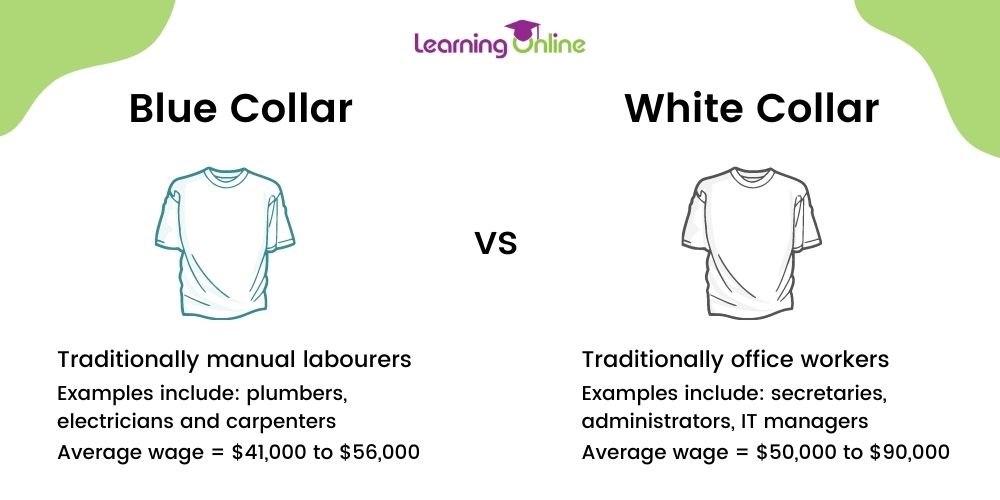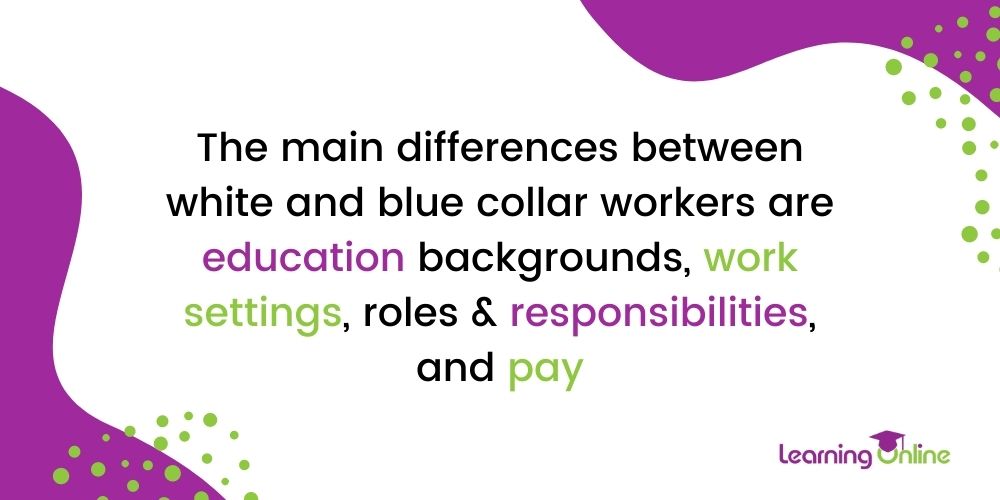The terms blue collar and white collar are common but confusing, particularly in today’s working culture where a lot of roles are literally…well…collar-less! But in short, these terms are used to differentiate work sectors.
Work uniform aside, there are many more helpful characteristics to associate the industries traditionally referred to as blue-collar or white collar. In this blog, we’re going to take a closer look at the defining differences between these roles, and what these terms mean on a practical level for your career prospects.
What is blue collar/what is white collar?
Unsurprisingly, the term blue-collar has its roots in referring to the shirt colour worn by workers. Traditionally, manual labourers wore sturdier, dark clothing, as due to the nature of their work their clothes could often become soiled or damaged, and by wearing durable fabrics like chambray the stains were better concealed.
In fact, the blue-collar meaning can be traced back to the 1920s, where workers traditionally wore a blue uniform during working hours and performed more hands-on specialised tasks. As an example, electricians, plumbers and carpenters are usually classed as blue-collar.
In comparison, a white-collar job is typically performed in an office environment and involves clerical, administrative or managerial duties. White-collar workers may or may not have a third-level education, but many do and are often referred to as ‘suits’ – due to the dress code many office environments employ. Of course, this is a very generalised overview, as not everyone who works in an office is expected to adopt such a formal dress code.
To this day, both terms are frequently used to identify different types of workers and their respective industries. However, it’s important to take note that there are some jobs that do not fit so neatly into either category – one example being the service sector
What is a blue collar/white collar worker? What are the differences between each job?
1. Education
- For white-collar positions, workers may need to have a high school diploma or bachelor’s degree, or have interned within a specific institution.
- In contrast, blue-collar positions generally offer on-the-job training, which could take the form of an apprenticeship or attending vocational schools. On the higher-paid, specialised end of the spectrum of blue-collar positions, higher certifications or technical skills may also be needed.
2. Work Setting
- The typical blue-collar work setting is an industrial location and features a significant degree of manual labour.
- White-collar jobs, in comparison, often take place in office or administrative locations, although they can be associated with working from home environments as well.
3. Roles & Responsibilities
- Blue-collar jobs entail manual labour and knowledge of occupational health and safety practices.
- White-collar workers predominantly carry out administrative and clerical work.
4. Pay
- Hourly wages are commonplace in blue-collar jobs, as is shift work.
- White-collar workers tend to be paid a monthly salary for a fixed number of working hours per week.
Examples of white collar and blue collar careers
To expand on the roles a white-collar worker may assume, these can include:
- marketing executive, secretary, financial adviser, administrator, company manager, and market researcher.
In contrast, examples of blue-collar sectors largely cover manufacturing, mining, construction, and maintenance, and career roles include:
- welders, painters, mechanics and electricians.
These are just a few examples, and sometimes the distinction isn’t as obvious as we’ve indicated above. When a role involves the performance of many different functions, it may include both manual labour and tasks more commonly associated with office work.
In these instances, neither term fits particularly well but indicates exactly how careers are evolving in the modern world, where a comprehensive set of technical and practical skills are required to assume any role.
The job market of any country is a combination of both blue-collar and white-collar workers, and the best jobs New Zealand has demand for include both blue and white-collar sector roles.
According to a recent study, the average blue-collar worker salary in New Zealand ranges from $41,000 to $56,000, whilst in the next 5 years this is projected to see an 18% increase by 2027. Indeed, research shows that some of the most in-demand jobs in 2022 in New Zealand are blue-collar, including the roles of machine operator (commanding a salary between $43,000 and $64,000 per annum), construction worker (earning between $47,000 and $72,000 yearly) and plumber (coming in at $65,000 and $96,000 per year) – these roles featuring fifth, sixth and seventh respectively on this list.
Equally, there are also wonderful options available in white-collar roles that don’t require years of study or a university degree but still offer a stable career path with plenty of progression opportunities for those who are interested.
Working as an information technology manager, a receptionist or executive assistant, a marketing manager, communications specialists, managing director, corporate trainer, or HR manager are all examples of highly popular white-collar careers. As an overview, the average salary New Zealand awards an executive assistant is between $50,000 and $90,000 per annum. Whilst for an information technology manager, the average lies between $110,000 and $180,000.
Whether you feel like your passion lies in getting hands-on and physical in your career, or you prefer a role that is more technology-focused, what’s clear is that there are heaps of opportunities to explore in every industry. And the best way to take the first step towards any of these careers is by completing a short course in a discipline that interests or excites you.
Is online learning something you feel could benefit your career prospects? Then you’ll definitely want to check out our range of amazing short courses, which cover everything from Small Biz, Admin & Reception through to Agriculture and Farming.
Doing an online course gives you the freedom and flexibility to build a career you love, at a time and pace that suits you. With some of the best online learning courses in New Zealand, you can get started on your new path or passion today.
Here at My Learning Online, we offer 24/7 learning access and a dedicated team of experienced tutors to help you every step of the way. Our online courses are built by experts to be suitable for students from all walks of life, ready to work around your current responsibilities and budget – so nothing will hold you back.
Plus, if you’re still unsure about what career path to take or are still debating whether a white collar or blue collar job would better suit your professional goals, then you can also speak to our career consultants! We’d be happy to help guide you through what options are the best fit for you.
Are you ready? Then let’s take the first step together, today.


